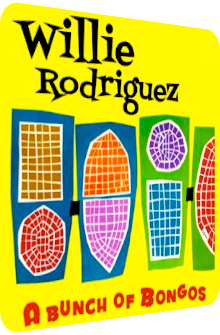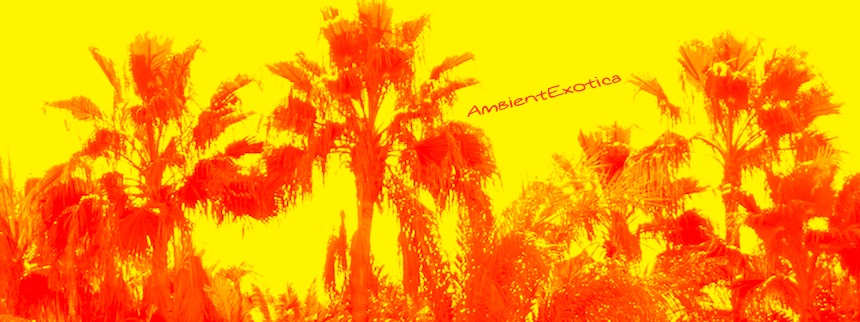
Willie Rodriguez
A Bunch Of Bongos
1960
The year is 1960, the bongo craze is at its full force, almost outshining the adjacent and ultra-compatible Exotica genre which itself borrows more than a simple maraca shaker or trumpet from Latin music. One artist with the long-winded name of Jose William Rodriguez De Jesus Escalante (1935–2010) aka Willie Rodriguez sees the opportunity to merge his skills as a trumpeter with the signs of the time. Having been part of many bands before, he is now leading a 16-piece ensemble called The International Stars and guides them through 12 Latin and Exotica tracks on his LP A Bunch Of Bongos.
Released on Grand Award Records and supervised by stereophile and luminary Enoch Light, the album features the talent of five trumpeters, among them Doc Severinsen and Mel Davis, unites them with saxophonist Stanley Webb, throws in the prominently featured guitarist Al Casamenti and sees drummers Sol Gubin and Cliff Leeman playing the bongos, timbales and other drums in great style. The album title, though precise and clear, might be misleading. This is not a drum-driven album, but a clear band effort. Not even bandleader Rodriguez is in the limelight. A Bunch Of Bongos is more about the interplay and sunny atmosphere than labyrinthine solo segues. The drums still shimmer through and carry each and every arrangement, be it easygoing or uptempo. What else there is to say in this regard will be delineated below.
Tico Tico is served as the opener, known for its tachycardia-inducing tunnel vision full of verdured flashes and sunlit haciendas. Originally envisioned by Ervin Drake and Zequinha Abreu, the version of Willie Rodriguez and his men differs mostly in speed. The tempo is situated in the upper mid ranges, gorgeously lit by joyously blazing horns and Al Casamenti’s Cool Jazz riffs. Curiously enough, Bebo Valdés’ following Penthouse Mambo isn’t much slower, comprising of superbly varied drum concoctions, with the bongos and congas hailing from behind the blotchy brass glissando. The Latin spirit is softened and wonderfully played down by hazy yet diaphanous piano tones and an overall accessible melody range.
While Rafael Muñoz’s Tropical Merengue is supercharged with Bobby Byrne’s dark trombone splashes and fibrillar trumpet counterparts, Ary Barroso’s Baía is the greatest rendition of side A, enchanting with its laid-back guitar globs and veiled brass granuloma. Even the bongos and maracas behave orderly and allow a streamlined mélange. Only Willie Rodriguez’s lead trumpet towers above the moiré here and there. Say Si Si by Al Stillman, Ernesto Lecuona and Francia Luban adds Al Casamenti’s sophisticated guitar riffs to an impressive array of cowbells, drums and shakers before the festivity is closed with George Cole’s and Pete Johnstone’s translucent Timbales Mambo whose glassy marimba droplets and warmhearted horns make it another high – and interim – endpoint.
Side B offers more of the same and does not degrade in quality at all. Another Mambo is introduced right at the beginning, Hugo Montenegro’s and John Monte’s Mambo Loco. Willie Rodriguez and his band soften the Crime Jazz heirloom and prefer to add marimba spirals and blazing cowbells as a comic relief to the often rufescent horn scatterama, with Johnny Conquet’s Estacy returning to the sun with a pinch of Dixieland timbres amid the golden guitar aureoles. Take It Easy by Albert DeBru, Irving Taylor and Vic Mizzy then continues the domestic-tropical journey with a cowbell-backed guitar-based marimba melody that is impressively ameliorated by sudden trumpet protrusions that add a vibrant energy to the high noon diorama, before Brazilia by Les Baxter is transmuted into a benthic horn helix. The vanillarific symphonic origin is mirrored by an augmented wideness; somehow, the bongo-accentuated arrangement – completed by Phil Bodner’s jungle flute – feels larger than the remaining material.
Whereas Cuban Mambo by Rafael Angulo and Xavier Cugat presents the latter’s archetypical lava-hot brass euphony and occasional tones in minor in a fitting fashion full of drum rivulets (if that makes any sense), Alan Surgal’s Merengue Chiu, Chiu kisses the listener goodbye via a solemn brass fusillade in tandem with hollow bongo beats, evoking a hammock-friendly apotheosis to an already magnanimously illuminated album.
Willie Rodriguez and his band deliver a Latin work with A Bunch Of Bongos that is keener on the sunny side of life than the more crepuscular and enigmatic early pieces of, say, Pérez Prado whose Voodoo Suite (1955) is hailed as the holy grail of all drum-driven Latin albums, as is Sabu’s Sorcery (1958). Willie Rodriguez, however, does only ever deliver a sunburst on this album, with not too many mephitic clouds in sight. This should not come as a surprise, given that Enoch Light has supervised and overseen the recording process. The result comess with both an advantage and a letdown though: the positive side consists of that typical Command Records sound with Jazz guitars, multitudinous horns and high-plasticity percussion patterns, the negative aspect involves the formulaic setting and way of interpretations.
This standardized premise is why one loves Latin music and Exotica gems, methinks, but it also adds to the weariness in the wake of several different bands that all have varying names but the same personnel on board. Since this is the kind of criticism that leads to nowhere when it is applied to the Easy Listening alloy, let me just say that A Bunch Of Bongos is a delightful artifact for those listeners who shy away from convoluted and aggressive percussion prose à la Chaino and rather want the melodies to be king. Willie Rodriguez delivers in this regard and will brighten up anyone’s day with the colorful chromaticity and neon bolts that grace each arrangement. The album is available on vinyl as usual, but has also been digitally reissued in 2011 by the Vintage Masters label for a reasonable price.
Exotica Review 394: Willie Rodriguez – A Bunch Of Bongos (1960). Originally published on Nov. 29, 2014 at AmbientExotica.com.
